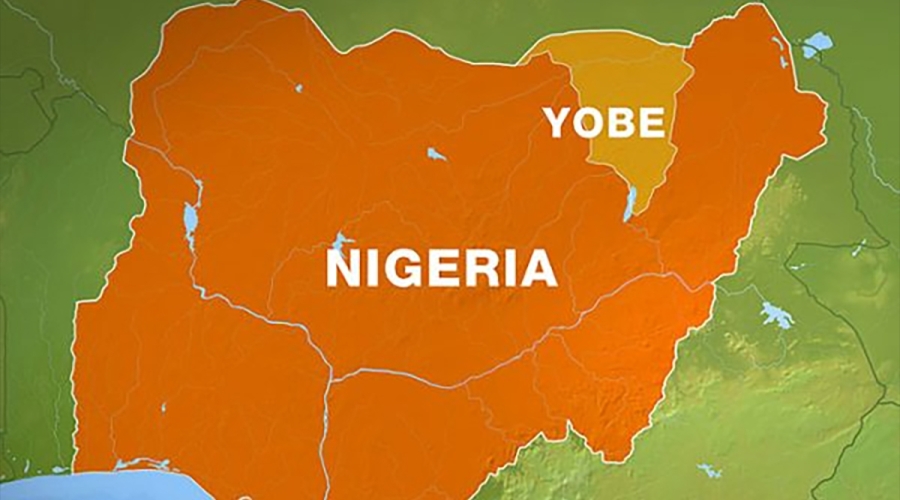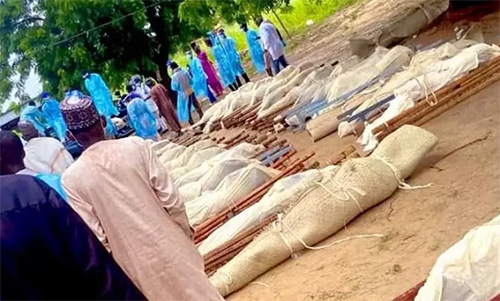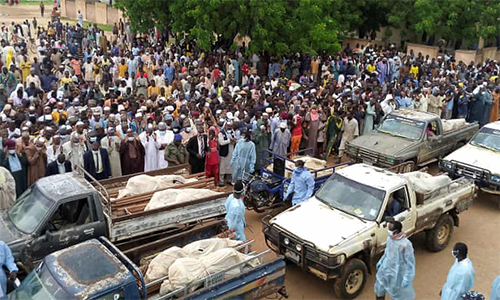Nigeria’s Presidential Jet Purchase as National Crisis Rages

Six days after Nigeria's President Tinubu flew off to France in a new $100 million presidential jet, Boko Haram slaughtered 170 Nigerians in Yobe State, a region long neglected by the government. If the president prioritized the security of his people as much as his luxurious plane, those lives might have been saved.
On August 19, 2024, Nigerian President Bola Tinubu took off for France aboard a newly acquired Airbus A330-200. This lavish addition to Nigeria’s presidential fleet of 11 aircraft, cost a staggering $100 million. Outfitted with state-of-the-art facilities, including a bedroom, conference room, and office space, the jet seemed to symbolize the priorities of Nigeria’s leadership – comfort and extravagance, even in the face of economic hardship and an ever-growing national security crisis.
Just six days after the president’s luxurious departure, Boko Haram struck once again in northeastern Nigeria. The terrorist group targeted Mafa, a village in Yobe State, and slaughtered at least 170 people in a brutal attack that left families shattered and homes destroyed. Local vigilantes, who had valiantly been protecting their communities with minimal resources, were overwhelmed. The military, unaware of the carnage due to a lack of cell service, arrived too late.
The contrast between these two events could not be starker. On the one hand, a president flying off to international meetings in an extravagant jet, and on the other, ordinary Nigerians left vulnerable to one of the deadliest terror groups in the world. If only the $100 million had been allocated to enhancing security and livelihoods in Boko Haram-infested regions, how many lives could have been saved? What if the government had been as focused on securing the lives of its citizens as it was on acquiring a plane?
Am on a mission to awaken and empower Africa through knowledge. If you would like to support our work, you can do so through: Paypal: This email address is being protected from spambots. You need JavaScript enabled to view it. Mobile money transfer number through Worldremit or MPESA: +254795591751
Click here to see exactly what your money will do:
https://environmentalafrica.com/donate
The Battle Against Boko Haram
For more than two decades, Boko Haram has wreaked havoc across northeastern Nigeria. Villages like Mafa, remote and often forgotten by the central government, bear the brunt of these violent attacks. While the Nigerian military has scored some victories, the frequency of these attacks raises a fundamental question: After all these years, is the military still unable to protect Nigerians? Is Nigeria’s intelligence community still unable to foresee and preempt these attacks even after two decades? Nigeria’s 2023-2024 budget allocated about $4 billion or 12% of the total budget to defense and security. That was the largest single allocation to any sector. That’s a lot of money! Yet the army couldn’t protect Mafa village’s helpless people because cell connection is unavailable in the area!
Months prior to the attack, Mafa’s local vigilante groups had actually done a commendable job of defending their people. Without much support from the government, these civilians risked their lives to stand up against Boko Haram’s onslaughts. But eventually, their fortress crumbled and the people fled to displacement camps. The government, instead of securing this region, ordered closure of these displacement camps. Why? To create the illusion that peace had returned to the region – a cruel mirage, shattered by the massacre in Mafa.
The cost of this illusion is counted in human lives. While the presidential jet may have reduced maintenance costs for the presidency, what about the costs borne by families who lost fathers, sons, and brothers in that tragic attack? What price do we put on human life?

Victims of the attack
Misplaced Priorities and a Dwindling Moral Compass
It is not that a president shouldn’t have access to safe, comfortable transportation, but the timing and extravagance of this purchase, against the backdrop of mass killings and economic hardship, shows a disconnection from the needs of the people. Peter Obi, a leading opposition figure, called the purchase “misplaced and insensitive,” and rightly so. As Boko Haram continues to thrive, feeding off the government’s neglect, how does a $100 million plane serve the average Nigerian?
Moreover, the secrecy around the jet’s purchase raises questions about transparency and accountability. The National Assembly, which should have approved the purchase, was kept in the dark. Such financial maneuvers undermine the democratic process and only add to the public’s growing mistrust in leadership.
A Government Desensitized to Violence?
The attack in Mafa is not an isolated incident, and that may be the most damning indictment of all. The regularity of Boko Haram’s violence over the last twenty years has bred a disturbing level of complacency. The Nigerian government’s response to these attacks is often slow, reactive, and under-resourced. The tragedy is that the people of northeastern Nigeria, especially in areas like Yobe State, have been forced to live in constant fear for years. Are they not Nigerians too, deserving of protection like any other Nigerian?
But where is the outrage from the halls of power? Where is the urgency to protect lives, rebuild communities, and restore a sense of security to these devastated regions? Instead, the focus seems to be on maintaining appearances, whether by forcing displaced people to return to unsafe areas or by purchasing luxurious jets.
The truth is that Nigeria’s government has grown desensitized to the suffering of its people. The attacks have become so frequent that they no longer shock or stir action. Each new massacre is met with the same cycle of public relations, delayed responses, condolences, and promises that are seldom kept.

They deserved better from the Nigerian Government. They deserved security.
The Real Cost of Neglect
What happened in Mafa is a tragic reminder that Nigeria’s priorities are dangerously skewed. When a government chooses to invest in luxury rather than in the safety and well-being of its citizens, it forfeits its moral authority. It absconds duty. The $100 million spent on a single jet could have gone toward beefing up security, strengthening local defense initiatives, or improving communication infrastructure in remote areas. It could have meant the difference between life and death for the people of Mafa.
If Nigeria’s leadership does not urgently recalibrate its priorities, this cycle of violence, neglect, and misplaced focus will continue. The people of northeastern Nigeria, and indeed all Nigerians, deserve better. They deserve a government that places their safety above all else, not one that flies away in luxury while they are left to fend for themselves.
In the end, the real question is: How many more lives must be lost before Nigeria’s leaders take the protection of their citizens as seriously as they do their own comfort?
This email address is being protected from spambots. You need JavaScript enabled to view it.
I seek to awaken and empower Africa through knowledge. If you would like to invest in my work, you can do so through:
Paypal: This email address is being protected from spambots. You need JavaScript enabled to view it.
Mobile money transfer number through Worldremit or MPESA: +254795591751
Click here to see exactly what your money will do:
https://environmentalafrica.com/donate

 En
En  Fr
Fr  Ar
Ar